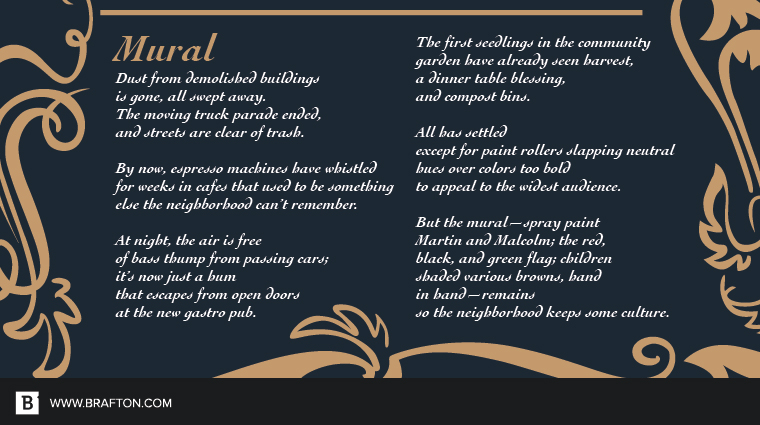Roses are red,
violets are blue,
meet Boston’s Managing Editor,
he goes by Q.
That’s about as far as my poetry skills go. But thankfully, there’s Boston Managing Editor Quintin Collins. Not only does he keep his Boston editorial team running smoothly at all times, but he’s also a talented poet. So much so, in fact, that he is currently studying for his Master of Fine Arts in Creative Writing at Pine Manor College.
Let’s give this poem thing another go, then – this time from Q:

Quintin’s love for creative writing stemmed from his elementary school years, when he wanted to write poems to impress girls. But as he got older, he realized just where his writing skills could take him.
„In high school, I went through a socially conscious phase and decided to ‚get serious‘ about my art,“ he explained. „In college, I sat down with the English department head to see what a creative writing curriculum looked like, and I couldn’t believe such fun classes would be work. Then, I was hooked.“
Quintin is a published poet, with several of his works included in print and online journals. And he plans on publishing his creative thesis as a full-length collection someday.
In college, I sat down with the English department head to see what a creative writing curriculum looked like, and I couldn’t believe such fun classes would be work. Then, I was hooked.
When he’s not writing inspiring poems, Quintin serves as the Managing Editor of one of the Boston editorial teams. He handles resource management, determining which writers are best suited for client accounts. He also troubleshoots bigger-picture problems related to client service, as well as mentoring his team on the aspects of writing, editing, professionalism and organization.
During his almost four years at Brafton, Quintin has been in several roles, starting out as a News and Content Writer for the Chicago Finance & Industry desk. He served as a Lead Editor, a Section Editor and a Content Manager before deciding to trade his Lake Michigan views in Chicago for Atlantic Ocean views in Boston, where he moved into his current ME role.
Let’s find out more about the man behind the poetry, his thoughts on the importance of editorial within content marketing, and the skills a writer needs to be successful in the industry.
What’s your typical day-to-day like as Managing Editor?
I come into the office around 8:00 a.m., swap out my commuting shoes, and grab coffee and water. Then I check email and handle tedious tasks before 9:00 a.m., when most everyone else comes in. From there, the day is a full-throttle blur of meetings, email, spreadsheets, troubleshooting and firing off bad puns.
What do you like most about working in the editorial side of things at Brafton?
Even as Brafton’s products and services have evolved since I started, Editorial has remained the backbone of production among all teams. This status is because few elements we offer omit writing: infographics need outlines, video blogs need scripts, consulting needs landing page copy, social media needs articles to post.
What is one project you have loved working on, either as ME, or as a writer?
I enjoy laying out campaigns for clients. Overarching strategies are useful, but within those umbrellas, we need targeted approaches. Set a quarterly goal, determine the target audience, and specify a pathway to persuade that audience. What is the theme behind this push? What assets appeal to the intended viewers? What are some possible paths to conversion? How will we measure the campaign’s success? Answers to these questions involve creative insight and data, and I love putting both sides in a room to build a campaign with intent.

What are some of the hurdles the Editorial department faces, especially with content marketing changing as quickly as it does?
One of the biggest challenges is topic ideation. As content marketing has expanded, so has our client base. We have more niche industries that seek our services, and Google’s focus on quality over quantity means our articles have become more than surface-level explanations. Brainstorming requires as much research as creativity these days, so the Editorial department must master its research tools.
What is one thing clients frequently request for their editorial strategy but that you advise against?
Clients still want a lot of content, and they push for a bottom-of-the-funnel angle for blogs. Fewer, higher-quality articles perform better than a bunch of articles that regurgitate news. Also, you have to ease readers into the content. The name of the game is inbound marketing, so viewers need value before you start bombarding them with your offerings.
What about new editorial trends on the horizon that you think companies should implement?
I believe the future of editorial is how it complements visual assets. Industry leaders have said for years video is the way to go, and custom images perform well in social. Editorial needs to scaffold those efforts as part of a campaign with visual assets as the capstones.
In your opinion, what are the required skills someone needs to have to succeed as a content marketing writer?
Writers need to understand storytelling and the intricacies of the sentence. You could give several writers the same data to write the same story. The strategic writers will know how to make the article cohesive and on brand while manipulating the text at the sentence level to persuade readers.
Writers should also understand every aspect of marketing to some degree. Editorial does not exist in a vacuum; overarching strategies and campaigns are holistic approaches.
As a kid, what did you want to be when you grew up?
I first wanted to be a police officer. Then, I wanted to be a Catholic priest until I found out they can’t marry. My next career aspiration was to be an Air Force pilot, but those hopes disappeared when I discovered you need 20/20 vision to fly. I moved on to dreams of auto design for several years during high school, and I eventually grew to love psychology. After spending two semesters as a psych major in undergrad, I discovered I actually wanted to write.
Besides poetry, do you have any other special/hidden talents?
I have a family history of bowling (10-pin, not the blasphemy that is candlepin). My grandfather, great uncle, father and uncle were on a team together when I was a kid. My mom and dad bowled together for a bit, and my aunt bowls as well. My father still bowls. Despite this lineage and more than a decade of practice, I typically average around 150. Meanwhile, my father can drop 280-plus after not bowling for years.
I also play tennis when I find the time.





